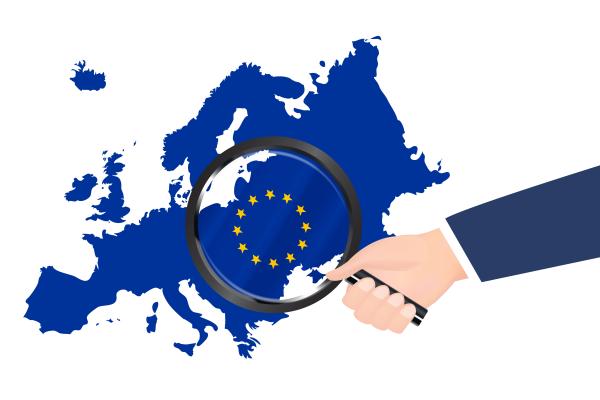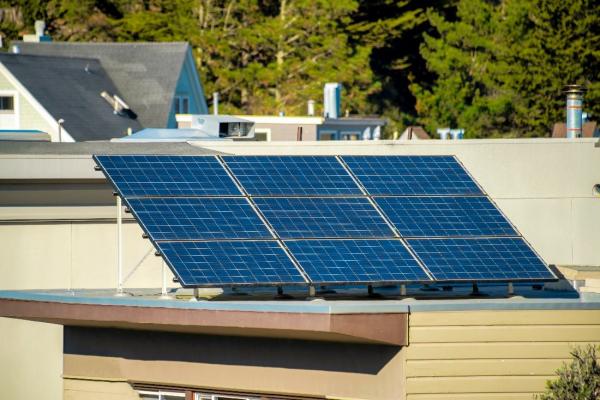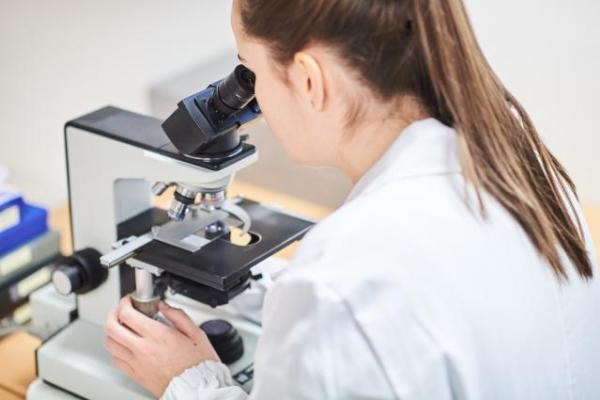
Following the unprecedented crisis caused by the COVID-19 pandemic, Czechia’s recovery and resilience plan has responded to the urgent need to foster a strong recovery, while making Czechia’s economy and society more resilient and future ready. In response to the energy market disruption caused by Russia's invasion of Ukraine, the Commission launched the REPowerEU Plan. The Recovery and Resilience Facility is at the heart of its implementation and its funding. Under REPowerEU, EU countries are updating their recovery and resilience plans with new measures to save energy and diversify the EU’s energy supplies.
Green transition
Focusing on green technologies and capacities - sustainable mobility, energy efficiency and renewables, climate change adaptation; circular economy; and biodiversity.
Policies for the next generation
Improving access to and the quality of general, vocational, and higher education; focusing on digital education, early childhood education and care; supporting youth employment.
Smart, sustainable, inclusive growth
promoting entrepreneurship, competitiveness, industrialisation; improving the business environment; fostering research, development and innovation, supporting small- and medium-sized businesses.
Digital transformation
Promoting the roll-out of very high-capacity networks, the digitalisation of public services, government processes, and businesses, in particular SMEs; developing basic and advanced digital skills; supporting digital-related R&D and the deployment of advanced technologies.
Social and territorial cohesion
Improving social and territorial infrastructure and services, including social protection and welfare systems, the inclusion of disadvantaged groups; supporting employment and skills development; creating high-quality, stable jobs.
Health and economic, social and institutional resilience
Improving the resilience, accessibility and quality of health and long-term care, including measures to advance their digitalisation; increasing the effectiveness of public administration systems.
The map exclusively serves information purposes and is not an exhaustive database of projects supported by the Recovery and Resilience Facility. It does not reflect the distribution of the projects funded by the Recovery and Resilience Facility across the European Union, nor across different geographical areas or sectors within EU Member States. The RRF funding amounts shown for measures are based on the initial cost estimates included in the recovery and resilience plans.
Furthermore, the projects showcased are without prejudice to any future assessment by the Commission in the context of verifying the satisfactory fulfilment of milestones and targets under Regulation (EU) 2021/241 establishing the Recovery and Resilience Facility.
Country snapshot

The country snapshot illustrates some of the most iconic and impactful projects included in the Czech Recovery and Resilience Plan that will bring positive change for EU citizens, businesses and the EU at large.
The reforms and investments in Czechia’s plan are helping it become more sustainable, resilient and better prepared for the challenges and opportunities of the green transition and digital transition. Following Council approval of Czechia’s plan on 8 September 2021, Czechia’s recovery and resilience plan was updated on 17 October 2023 also to introduce a REPowerEU chapter.
- 105 investment streams and 58 reforms
- 43% of the plan will support climate objectives
- 23% of the plan will foster the digital transition.
The transformative impact of Czechia’s plan is the result of a strong combination of reforms and investments which address the specific challenges of Czechia.
The reforms address bottlenecks to lasting and sustainable growth, while investments are targeted to accelerate the transition towards low-carbon and climate-resilient economy, to maximise the benefits of the digital transformation and improve the quality of public administration. The plan also aims at fostering social cohesion and resilience by increasing the availability and quality of healthcare, tackling inequalities in education and investing in pre-school facilities.
All measures have to be implemented within a tight time frame, as the Regulation establishing the Recovery and Resilience Facility requires all milestones and targets within the national plans to be completed by August 2026.
REPowerEU measures in Czechia’s plan
Czechia’s plan now includes 15 reforms and 9 investments to reduce its reliance on fossil fuels, in line with one of the REPowerEU Plan's objectives.
To finance this increased ambition, Czechia has asked for its Brexit Adjustment Reserve to be transferred to the plan, amounting to €55 million. These funds will be added to Czechia's REPowerEU grant of €681 million.
Key measures for REPowerEU
The REPowerEU measures include 15 reforms and 9 investments that strongly contribute to the green transition.
The 15 reforms will, for example:
- Facilitate the Renovation Wave by supporting and advising households, businesses and public sector entities in the renovation of their buildings;
- Streamline and accelerate permitting for renewables;
- Simplify the linking of renewables to the grids; and
- Provide support to energy communities.
The 9 investments will facilitate the modernisation and digitalisation of the electricity grid, develop new photovoltaic energy sources, electrify railways, support the purchase of electric or hydrogen vehicles and cargo e-bikes by private companies, and promote green skills and sustainability in universities.
Together, these measures are expected to increase Czechia’s share of renewable energy and accelerate decarbonisation of energy generation, building and transport sectors
Czechia has significant unused potential for using electricity grid capacity more efficiently. The objective of this reform is to improve the use of available electricity grid capacity and to facilitate the connection of renewable energy sources to the grid and self-consumption..
The reform will introduce binding time limits for grid connection procedures and for reservation of grid capacities, adapt rules for the re-release of unused capacities, introduce financial incentives discouraging the non-utilization of allocated capacities, and introduce transparency maps including information on available grid connection capacities.Moreover, the reform will revise the regulatory framework governing investments and tariffs, in view to ensuring smooth integration of additional renewable energy sources into the Czech energy mix.
Green transition
In the area of climate and environmental policies, Czechia faces the challenge of increasing the share of renewable energies in the energy mix, improving the energy efficiency of its building stock and making mobility and the transport sector more sustainable. Nature protection, in particular with respect to biodiversity, forestry and water bodies, also requires more attention.
Key measures for the green transition
- Around 25% of the plan is allocated to investments in energy efficiency and renewable energy:
- €1.6 billion will finance large-scale renovation programmes to increase the energy efficiency of residential and public buildings, including childcare and long-term care facilities.
- €907 million will be invested in installation of renewable energy sources for both households and businesses.
- €316 million will finance the modernisation and digitalisation of electricity distribution grids strengthening the integration of renewable energy.
- The plan supports the green transition also through investments of €1.2 billion in sustainable mobility, notably in low-emission vehicles for the business sector, improving railway infrastructure, and promoting electric charging stations and cycling pathways.
- Further €121 million are to be invested in circular economy, including recycling infrastructure and support for circular economy solutions and water savings in businesses.
- The investment in forestry management aims at increasing sustainability of Czech forests for €335 million.
The modified plan, including the REPowerEU chapter, has further strengthened the focus on the plan on the green transition, devoting 43% of the available funds to measures that support climate objectives (up from 42% in the original plan).

The measures address the challenge of high and non-renewable energy consumption in households by funding renovations improving the energy efficiency of buildings and increasing the role of renewables.
- Project locations
- Czechia
Digital transition
Digital challenges for Czechia include improving connectivity through very high-capacity networks, increasing the offer and uptake of e-government services and supporting the digitalisation of companies, notably SMEs. Advanced digital skills need to improve to address the growing need of organisations and companies to quickly go through the digital transformation.
Key measures for the digital transition
- Czechia’s recovery and resilience plan supports the digital transition with investments and reforms in digital skills, e-government, digital connectivity and digital transformation of businesses.
- Besides revamping the digital curricula in education, digital skills are supported by investment of €585 million in digital equipment for schools, training for teachers, new university programmes in fast-growing digital fields and upskilling and reskilling courses for citizens.
- The construction of university infrastructure is supported with €368 million.
- The plan is investing €790 million in cyber-security and the digital transformation of public administration, the justice system and health care.
- The digital transition is also being supported by investing €662 million in the digital transformation of businesses, digital innovation hubs and very high-capacity networks and 5G networks.
The modified plan has further strengthened the focus on the plan on the digital transition, devoting 23% of the available funds to measures that support digital objectives (up from 21% in the original plan).

The Recovery and Resilience Facility supported the purchase of 74,000 digital devices (mainly laptops) for distance learning.
- Project locations
- Czechia
Economic and social resilience
Key macro-economic challenges for the Czechia’s economy include the industry’s exposure to the risks posed by automation and the green transition, the low levels of R&D funding for early-stage innovative firms, inefficiencies in public administration, growing inequalities in education, skill mismatch, low labour market participation of women and the low skilled and low affordability of housing.
Key measures in reinforcing economic and social resilience
- In order to reinforce economic and social resilience, the plan foresees:
- €222 million to improve the business environment, in particular through improving access to finance for companies, reforming and accelerating construction permitting procedures, reinforcing anti-corruption measures and boosting cooperation between public and private research.
- Reforms and investment of €451 million shall help ensure equal access to education, notably through increasing access to affordable pre-school care, reinforced support for disadvantaged schools and additional tutoring for children at risk of failure.
- Czechia will also invest €826 million in increasing the resilience of healthcare and social services, be it through building new hospitals and social care facilities, acquiring new medical equipment, strengthening cancer screening programmes or rolling out e-Health.
- Finally, €358 million will be dedicated to supporting new construction of affordable housing, flanked by an adoption of the housing affordability act.

This measure funds five research & development consortia in the areas of infectious diseases, cancer, neuroscience, cardiovascular diseases related to diabetes and obesity, and research on the socio-economic impact of diseases.
- Project locations
- Czechia
ANNUAL EVENTS
- Czech Second Annual Conference on the RRF was held on 16 May 2024.
- The event was organised by the Ministry of Industry and Trade in cooperation with the European Commission at the Kaiserstein Palace in Prague.
- The conference agenda included discussions on the major reforms implemented under the RRP, the future of the Recovery and Resilience Facility (RRF) and Cohesion Policy funds and presentations of projects.
- The 2023 Annual Event on Czechia’s recovery and resilience plan took place on 24 January 2023.
- Participants included the European Commission, Government of Czechia, and a broad range of stakeholders, including economic and social partners, NGOs, and academics.
- The discussions focussed on the implementation of Czechia’s recovery and resilience plan in the areas of the energy and digital transitions and social resilience and the challenges identified in the European Semester process
EUROPEAN SEMESTER
The plan is consistent with the challenges and priorities identified in the European Semester, the annual cycle of coordination and monitoring of each EU country’s economic policies. For a detailed explanation of the European Semester see the following link: The European Semester explained | European Commission (europa.eu)
National recovery and resilience website
Original Recovery and Resilience Plan (September 2021)
Ke stažení | Národní plán obnovy (planobnovycr.cz).
Updated Recovery and Resilience Plan (October 2023)
Original Recovery and Resilience Plan
Documents
Commission Staff Working Document: Analysis of the recovery and resilience plan of Czechia
Press Material
Press release: "European Commission endorses Czechia's plan"
Factsheet: Czechia’s recovery and resilience plan
Further Information
Presentation to the Council of Czechia’s recovery and resilience plan
Summary of the assessment of the Czech recovery and resilience plan
Updated Recovery and Resilience Plan
Documents
Press Material
Daily News: Czechia submits request to revise recovery and resilience plan and add REPowerEU chapter
Pre-financing
Press release: "European Commission disburses €915 million in pre-financing to Czechia"
First Payment Request
Preliminary assessment of the first payment request of Czechia
Commission implementing Decision on the authorisation of the first disbursement to Czechia
Press material
Questions and Answers on Czechia's disbursement request under NextGenerationEU
Daily News: Commission disburses first payment to Czechia
Second and Third Payment Request
Documents
Press material

